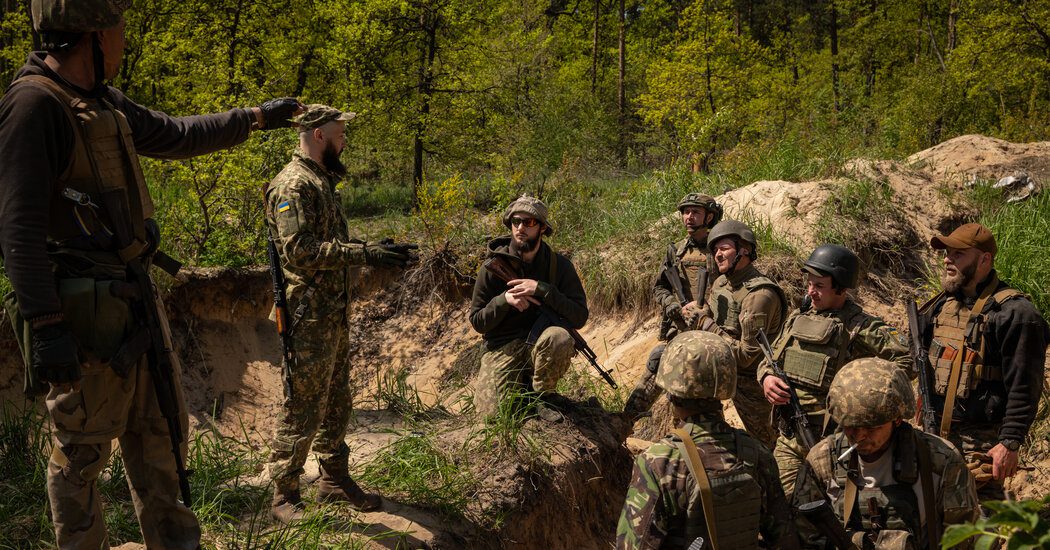Global Courant 2023-05-12 20:47:50
Ukraine’s planned counter-offensive against Russia has overshadowed talks of a possible negotiated settlement in the conflict, but some US and European officials say the next phase of the war could create momentum for diplomacy.
It is unclear how officials will define the success of the counteroffensive, which could last for many months, or how the outcome might affect their approach. Opinions among military strategists vary widely on whether Ukraine is likely to recapture territory after more than a year of war.
For now, President Vladimir V. Putin of Russia has shown no signs of making concessions or engaging in meaningful dialogue.
And US officials remain wary of calls for an immediate ceasefire or peace talks, especially those from China. Beijing continues to try to play peacemaker, despite clear strategic alignment with Russia. Foreign Minister Qin Gang toured Europe this week to try and sell the idea that China can lead the negotiations.
Some European officials who met Mr Qin have expressed skepticism. And in Washington, Secretary of State Antony J. Blinken met with his counterparts from Britain and Spain this week to bolster pledges for military aid to Ukraine, sending a message that winning on the battlefield is the priority.
Blinken said at a press conference with British Foreign Secretary James Cleverly on Tuesday that the Ukrainians “have what they need to continue to be successful in retaking territory that has been forcibly taken by Russia over the past 14 months”.
Like Mr. Blinken, Mr. Cleverly did not mention diplomacy with Russia at all, but focused on military aid: “We must continue to support them, whether or not this upcoming offensive produces huge gains on the battlefield, because until this conflict is resolved and properly solved, it’s not over yet.”
Ukrainian leaders also say they will not agree to talks until they push back Russian troops.
Still, President Biden’s aides have been exploring potential endgames and trying to find an outcome that could be acceptable to both Kiev and Moscow if genuine peace talks begin, US officials say.
“I know senior government officials regularly have conversations about what peace would ultimately look like with our Ukrainian counterparts,” said Washington Rep. Adam Smith, the top Democrat on the Armed Services Committee, “while simultaneously having conversations about how to arm them.” and reclaim as much territory as possible.”
Mr Biden’s aides and European officials say their best hope is for Ukraine to make substantial gains from the counter-offensive, which would give it more clout in any negotiations.
But whatever the leaders may think, US officials say most Ukrainians are reluctant to compromise with their Russian attackers.
And US officials fear that even if the Russian military suffers more setbacks this summer, Putin still believes he can win a war of attrition.
Avril D. Haines, the director of national intelligence, said in congressional testimony last week that while Mr. Putin “scaled back his short-term ambitions” in Ukraine, the likelihood of Russian concessions at a negotiating table this year “will be low are”. .”
Another senior US official said that regardless of the success Ukraine achieves, the Russian leader could simply order wider service mobilization to rebuild some of his military power.
Mr. Putin could also benefit as the 2024 presidential campaign gets underway in the United States, with former President Donald J. Trump an early Republican front-runner. Mr. Trump and several Republican politicians have called US aid to Ukraine wasteful and dangerous.
China has pushed for a mediating role since unveiling a vague peace initiative in February. While Mr Blinken and some top European diplomats say they are open to the possibility of China playing a helpful role in the future, they criticize Beijing for not publicly acknowledging Russia as the aggressor in the war. They insist that a country unwilling to do so cannot be trusted as a sober mediator.
China’s leader Xi Jinping made a state visit to Moscow in March and expressed continued support for his country’s partnership with Russia, which the two governments said had “no borders” just before Russia invaded Ukraine in February 2022. China’s special envoy for its peace initiative, Li Hui, was the ambassador to Russia for 10 years and got a medal from Mr Putin.
US and European officials are also suspicious of calls for peace talks that do not include a demand that the Russian military withdraw from Ukrainian territory first, which is the position of President Volodymyr Zelensky of Ukraine. China has not taken an explicit stance on Ukraine’s territorial integrity, and US officials say China and Russia could use the appearance of talks to freeze front lines – and Russian gains.
In her congressional testimony, Ms. Haines said Mr Putin could use a ceasefire to try to regain his strength while also “buying time for what he hopes will erode Western support for Ukraine”.
She added that “he may be willing to claim at least a temporary victory based roughly on the territory he has occupied.”
Mr Blink said recently it was “positive” that Mr. Xi had finally spoken to Mr. Zelensky last month, but he was “still unsure” if China was willing to accept that Ukraine was the victim. Annalena Baerbock, Germany’s foreign minister, said almost the same thing directly to Mr Qin at a press conference on Tuesday: “Neutrality means taking the side of the aggressor, and so our guiding principle is to make it clear that we are on the side of the victim.”
The main argument for China’s greater role in diplomacy is the fact that the country is Russia’s most powerful partner and that Mr. Xi and Mr. Putin have a personal connection. The war in Russia has turned the world economy upside down and put China in trouble.
“On principle,” Mr Blinken said, “countries – especially countries with significant influence like China – would be a good thing if they are willing to play a positive role in trying to bring peace.”
The White House said Thursday that Jake Sullivan, the national security adviser, spoke about Ukraine with Wang Yi, China’s top foreign policy official, at a two-day meeting this week in Vienna.
The debate in Washington over possible peace talks is amorphous and paradoxical. There are even competing arguments based on the same hypothetical outcome: If Ukraine makes substantial gains, it could mean it’s time for talks, some officials say — or it could mean Ukraine should put diplomacy on the backburner and must keep fighting.
If Ukraine fails to seize significant territory, some US and European officials may want to push Mr. Zelensky for a negotiated settlement.
“The dynamics will shift even if Ukraine makes marginal gains,” said Smith, the Democratic legislator. After several more months of war, he predicted, both sides will be exhausted.
But some officials and analysts in Washington caution against such thinking.
“There has always been a desire among some people in Washington to say, look, if Ukraine doesn’t make a profit — or if they do — maybe it’s time to have a conversation about Ukraine seeking a settlement” , said Alina Polyakova, the president of the Center for European Policy Analysis.
“I personally find that shocking,” she added. “Territorial concessions would validate Russia’s aggression, setting a global precedent for China and others that such tools work. Second, it would also mean that the West would have to accept the moral implications – accepting war crimes and condoning continued human rights violations.”
Of the top U.S. officials, General Mark A. Milley, the Chairman of the Joint Chiefs of Staff, was the most vocal about the need for Ukraine and Russia to consider negotiations, arguing that a prolonged war would result in far more casualties. Mr Blinken has taken a different position. “There must be a profound change in the mind of Mr. Putin and in the mind of Russia for meaningful diplomacy to take place,” he said last week.
The Secretary of State and other US officials have made vague statements about what they see as a viable end to the conflict.
At least twice in recent months, Mr Blinken has pointed to the need for Ukraine to reclaim territory that has been “forcibly taken by Russia in the past 14 months,” as he put it on Tuesday. But years before this invasion, Russia seized effective control of hundreds of square miles of eastern Ukraine and annexed its Crimean peninsula in March 2014.
It is unclear whether Mr Blinken deliberately differentiates between those parts of the territory. Ukrainian leaders insist their goal is to reclaim every inch of their lands seized since 2014, including Crimea. But many US officials and analysts believe that Putin would take more drastic measures to maintain his grip on the peninsula.
Some US officials have raised the possibility of at least forcing Russia to demilitarize Crimea so that it cannot be used as a training ground for future attacks on Ukraine. But that outcome would be almost as hard for Putin to accept. The Russian Black Sea Fleet is stationed in the Crimean city of Sevastopol.
Mr Blinken said last week that a “just and lasting” peace plan “cannot ratify what Russia has done, which is to seize so much of Ukraine’s territory.” Nor can it allow Russia “just to rest, retool and attack again six months later or a year later”.
Julian E. Barnes reported from Washington and Steven Erlanger from Brussels.








